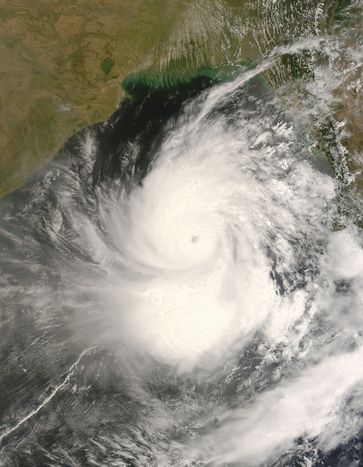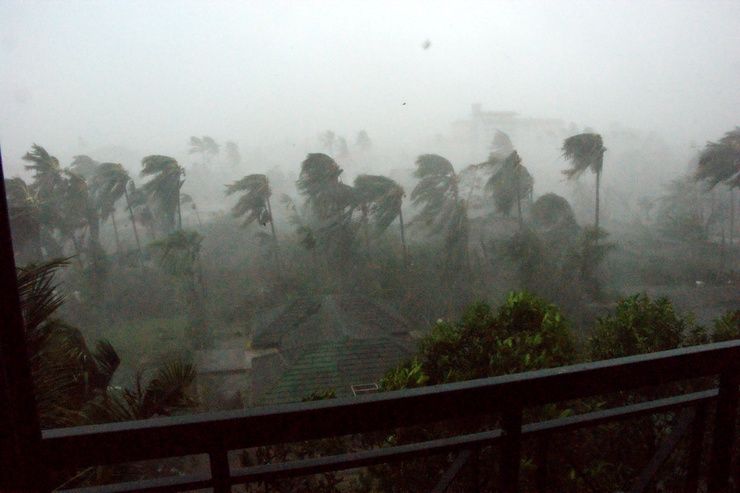
Burma cyclone: how to force the junta?
Published on
Translation by:
Susannah Readett-BayleyAfter a tropical cyclone on 4 May, Burma faces a major humanitarian crisis. The military junta in power will not succumb to international pressure to allow emergency assistance to enter the country. What can Europe do?
While some experts have estimated the death toll at 100, 000 and a more than a million affected by the tragedy, the Burmese Foreign Ministry announced on 9 May that ‘Burma is not yet ready to receive research and emergency assistance teams or international journalists,’ even if they did claim to ‘greatly appreciate the generosity of the international community.’
A generosity that the people of Burma can not yet rely on because of the attitude of their closed and aging administration, condemned by the international community too. John Holmes, deputy secretary general of the United Nations, voiced his extreme frustration concerning the disaster in Burma during an interview given to French daily Le Monde on 8 May. He said he was unable to understand the junta's unwillingness to let emergency teams into the country: ‘Whatever they are afraid of, we are there temporarily to bring in aid. That's all.’
The central question is the right to intervene to bring humanitarian aid to the people of Burma. This right to intervene recognises the right of governments to go against the authority of another government if violent infractions of people's rights occur. For the US, who has never hidden its hostility towards the regime in Burma, there is no question. On 8 May, a senior member of the state department announced that they would soon be sending airdrops of aid to the victims, with or without authorisation. A solution that could succeed in bringing first aid to the victims, but that could also lead the junta to dig their heels in even further, and even worse, according to John Holmes, to an ‘armed conflict’ between the two countries. ‘Would going down the conflict road bring help more quickly to the people who really need it? Personally, I don't think so.’

Missed opportunity for Europe
With no constructive dialogue being possible between Burma and the United States, Europe took its chance to make itself heard in the political sphere. According to French foreign minister Bernard Kouchner, the European commission announced that it would provide two million euros donated by all 27 member countries. Faced with this emergency France, supported by Great Britain, tried to push for a UN resolution that would allow for humanitarian aid to enter Burma based on a clause on the ‘responsibility to protect’ civil populations. This move that had no chance of success, given the internal problems of China in Tibet and Russia in Chechnya, and all the more given that China is an official ally of the junta in power in Burma.
How could the fifteen member countries of the UN security council realistically recognise the right to intervene? According to diplomats present for the security council meeting, six supported China and Russia (South Africa, Indonesia, Vietnam, Costa Rica, Libya and Panama), and positioned themselves against UN involvement, their role being one of peacekeeping and security in disaster management. One Chinese political advisor ironically appeared to ask whether the security council were called up on in the devastating heat wave that hit France in 2003. Unsuccessful. The right to intervene could only ever be approved by an international organisation. If the UN can't instigate it because of the deep internal disagreement between its members, who could?
Video: Rangoon being hit by Nargis cyclone, 3 May (mizzimanewsTV/ Youtube)
Some possible solutions?
First of all, it is not impossible that the Burmese regime might bend to international pressure. China could make the most of their good relationship with the junta to persuade them to accept outside aid, particularly from China. In this way they would reinforce the influence they have in the region and gain credibility in the international political arena. The hypothesis that could soon become reality. On 8 May Qin Gang, the spokesman for the Chinese ministry of foreign affairs, announced on that the Chinese government's decision to increase the 7 million yen (1 million USD) initially pledged by another 30 million yen (about 4,3 million USD). This considerable sum however, will go directly into the hands of the Burmese regime.
Already the victims of a heavy repression in September 2007, Burmese citizens may manifest their frustrations at a regime that have again proved their total lack of consideration for the population in the near future. This was demonstrated in the televised message by Burmese generals, who called for the population to vote ‘yes’ in the referendum for a constitution that would increase army's power that made no reference to the victims of the cyclone. The number of people that turn out to vote could give an indication of the Burmese state of mind towards the military regime that has been in place for sixty years. For the moment however it is time to help the victims. Given the serious lack of resources provided by the junta, the population can only rely on themselves while the international community grows increasingly frustrated.
Translated from Forcer la junte birmane



